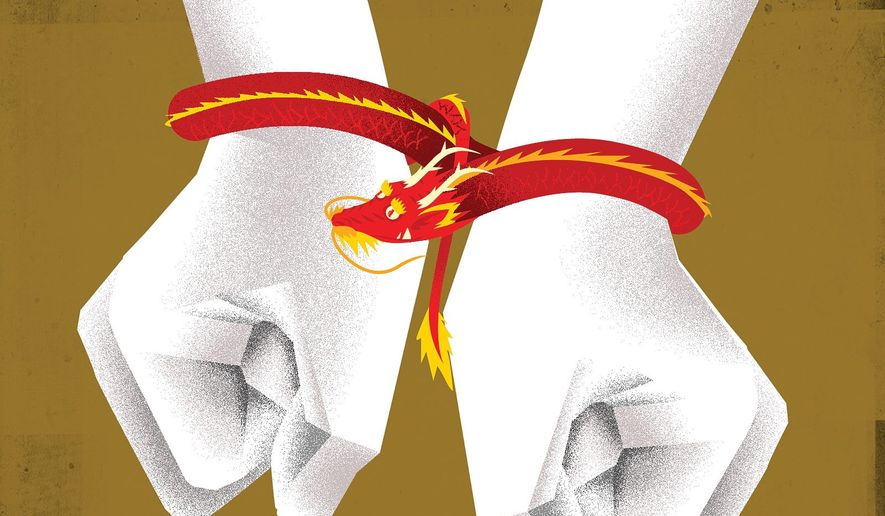OPINION:
Unlike our country’s elites, one group of Americans never harbored illusions about China’s communist dictatorship: The families of U.S. servicemen reported captured but never returned by the People’s Republic of China (PRC).
“My grandfather’s legacy and what he gave for his country is why I wore a uniform and why four of my sons have worn a uniform,” explains Terri Mumley, a retired Army Staff Sergeant who served in Afghanistan, as did her husband and two of her sons. “There should be no secrets anymore; it’s been way too long to continue to hide what happened.”
The People’s Liberation Army (PLA) killed thousands of Americans during the Korean, Cold, and Vietnam Wars. Service members from these conflicts and World War 2 remain unaccounted for in China. Among them: Lloyd Smith Jr., Ms. Mumley’s grandfather. Known for his love of family and pickup baseball, Mr. Smith was aboard a Navy reconnaissance plane downed by Chinese gunners in 1953. US rescuers last tracked Mr. Smith and fellow crewman William McClure in a raft approaching the shore of Shantou, China. After a Chinese manhunt, the sailors were captured and paraded through Shantou, according to contemporaneous media reports.
“It is the opinion of this command that Smith and his companion survived the ditching without injury,” concluded a long-classified Navy report. “They were probably taken prisoner by the Chinese Communists.”
At the same time, Beijing held Americans in POW camps it controlled in North Korea. Under the Korean War Armistice, the PRC promised to account for them and repatriate all who so wished. It didn’t. Some examples: Richard “Dick” Desautels, a handsome Vermont teen, asked fellow GIs to warn the Pentagon he would be kept. Beijing never returned him, claiming Mr. Desautels had “escaped.” Harry Moreland also “escaped,” China asserted, not explaining how a double amputee could break out of a mountain prison camp. Near war’s end, Chinese officers drove Gerald Glasser away in a jeep; China said he too “escaped.”
These were captives in North Korean prisons acknowledged by Beijing. More Americans were seen in secret prison camps inside China “confirmed” by the CIA and Army intelligence. Beijing and its allies only intended to release those in the known camps, according to the intelligence, and planned to retain inhabitants of the secret Chinese camps for use as technical experts, espionage assets, hostages, and laborers. According to a futile 1954 State Department demand that Moscow release them, some were shipped on to the USSR, along with the intel behind it.
Right after the war, US negotiators demanded a real accounting, supported by Congress and public opinion. That effort dwindled as the Pentagon declared the men dead. Secret Air Force and Army requests for covert CIA rescue operations were declined. Intelligence units tasked with finding the men turned to other missions. As time passed, the US recognized China, gave it preferred trading status, and helped it become a global power – all without requiring the truth about our POW/MIAs.
The families kept prodding the US government, which eventually asked the PRC once again about a handful of cases. In a 2003 surprise behind closed doors, the PLA admitted it had lied for fifty years about Dick Desautels, the Vermont farm boy who predicted his own disappearance. He had not “escaped,” conceded the PLA, but was secretly spirited from Korea to Shenyang, China (a location where wartime US intelligence identified a secret POW camp.) There he died of sudden “mental illness,” the PLA claimed, saying it had lost Mr. Desautels body and his 9-10 page file remained “classified.” While failing to demand that classified file or push for new negotiations based on the revelation, the US eventually agreed to pay the PLA for access to POW/MIA records. This turned out to be a communist “bait-and-switch.” Files on Americans China imprisoned but never returned, the PLA explained, were classified and not part of the deal.
This week the Defense POW/MIA Accounting Agency (DPAA) updates family members, including Smith’s relatives. DPAA will report it held a virtual meeting with the PLA earlier this year, says a spokesman, though with no tangible progress. “Any time you have discussions of any kind, that’s a good result,” he adds.
Discussions are not enough for Lloyd Smith’s kin. “My family has been asking questions for too long,” says Robbie Bailey, 26, Mr. Smith’s great-grandson and the fourth generation, to seek the truth. “I know my great grandfather’s story is out there,” says the Air Force veteran, “and it is time we know what it is.”
• Mark Sauter leads the non-profit POW Investigative Project, www.powinvestigativeproject.org, a multi-lingual program to crowd-source POW/MIA clues and party to a lawsuit to force the CIA and National Archives to release still-secret POW records dating to the 1950s.




Please read our comment policy before commenting.